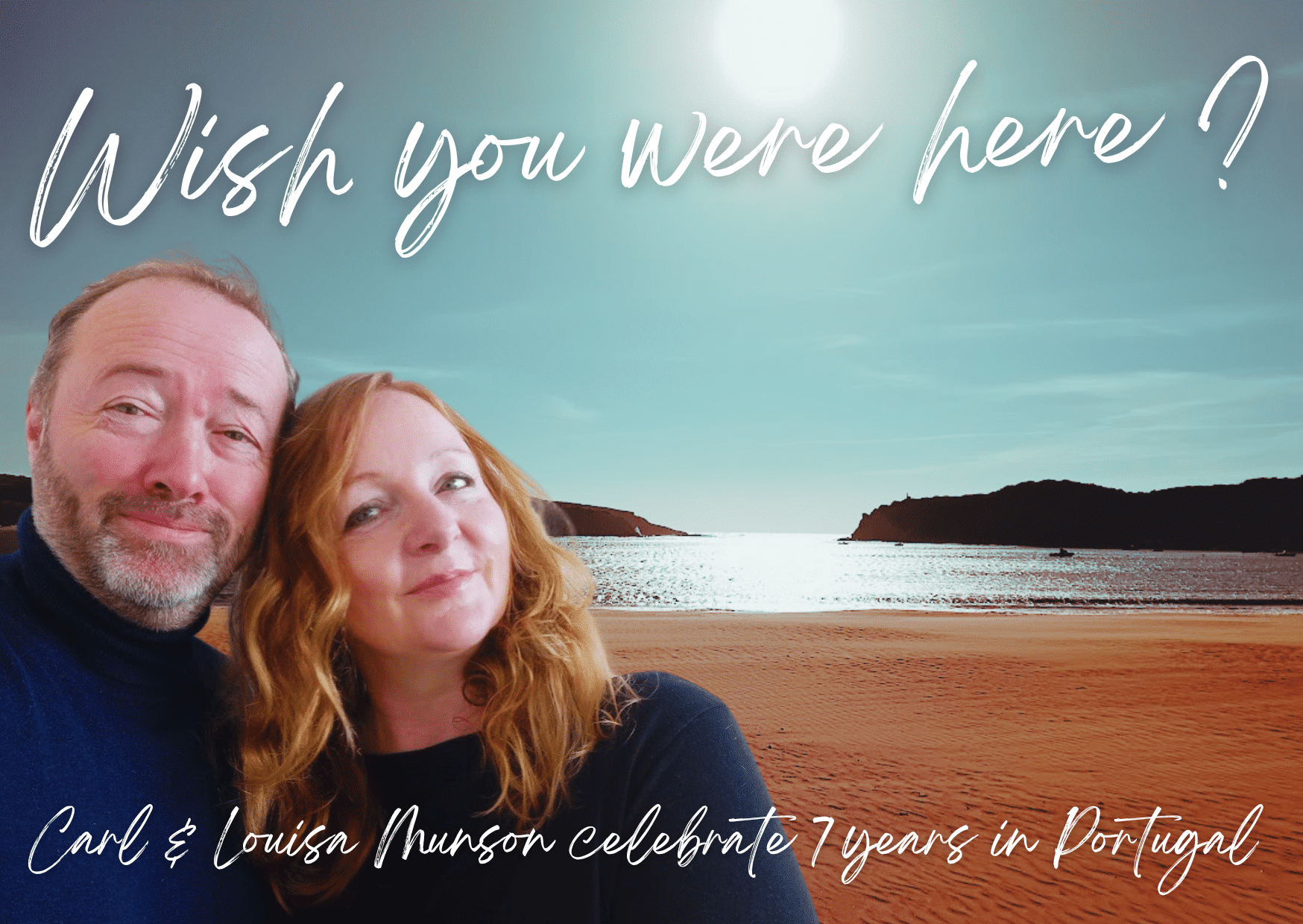It’s been seven years, pretty much to the day, since I moved to Portugal with my wife Louisa and our two young children. Since then, and in this truly marvellous (look it up) country, another child has been born to us – the pinnacle of many Portuguese blessings that have come in that time. This place, and its enchanting culture, have made their mark on us, leaving us with no regrets, and maybe just one or two “it would be nice if…” bits of ‘feedback’.
Seven years is a good span to look at, where we might recall and celebrate the stand-out moments and milestones; as well as review and release the let-downs and drawbacks, which I will share with you today. This is a personally historical juncture for me and mine, and one where we’re told an itch can develop, for which I am unsure there is a cream.
Good old Wikipedia tells us that the ‘seven-year itch’ is a “popular belief, sometimes quoted as having psychological backing, that happiness in a marriage or long-term romantic relationship declines after around seven years.”
The condition is thought to have taken its name, at least in part, from the play written by George Axelrod in 1913, which was popularised in a movie adaptation featuring Marilyn Monroe and Tom Ewell, that you may remember. Since that dramatic impression onto the collective psyche, “the phrase has since expanded to indicate cycles of dissatisfaction not only in interpersonal relationships, but in any situation such as working a full-time job or buying a house, where a decrease in happiness and satisfaction is often seen over long periods of time,” continues ‘The Free Encyclopedia’.
The original meaning, prior to Axelrod’s play, referred to scabies or skin disease, and was referred to, as such, by Henry David Thoreau in Walden in 1854, for which there is most certainly a cream. At this point, let me point out that whilst we have had scabies in Portugal (it’s a long and child-related story!), we are not bored, restless or keen to go anywhere else. Far from it. We’ll stay here, thank you very much, for as long as the government will allow us to, and for as long as our Portuguese neighbours and hosts remain hospitable, in the special way that we have become accustomed to.
So, what are the stand-out moments and magical milestones apart from having and raising a child here, catching scabies and becoming deeply attached to the culture, people and lifestyle?
According to Rudolf Steiner, Austrian occultist, social reformer, architect, esotericist, and claimed clairvoyant (busy bloke), humans live their lives (presumably, God willing) through 10 cycles, each lasting seven years. This corroborates with the biblical ‘threescore years and ten’ and gives us another way of looking at seven-year cycles, which Steiner believed brought particular challenges, from which we learn life lessons, sharpen our physical and emotional instincts, and grow spiritually.
Through that lens, these last seven years have brought all of the above, and interestingly, the astute Austrian ascribes my particular age as one in which I might be all about “continuity and reflection in later life”, with which I again concur.
My years of being fifty-plus in Portugal have thankfully brought continuity, and along with literal survival, thoughts (and actions) around my children’s and grandchildren’s future. And so too with reflection, where all the febrile existential concerns of the younger man find now calmer philosophical analysis and practical application, made easier by Portugal’s easier-going and family-centric way of life.
It’s true to say this time has flown by too, as if it were a single dog year, but seven it is in the human scheme, where my appreciation of Portuguese food and drink has grown and deepened into a great affection and daily delight. Where once we were agog, frozen and regularly mute with terror on hearing the Portuguese tongue, we now speak ‘café Portuguese’ and exchange basic greetings and orders of the day with neighbours and passers-by, which brings a regular and natural social pleasure.
And even in times of great crisis and tragedy, as we witnessed with the wildfires of last week, the power of compassionate community is ubiquitous and profoundly moving, as this society sets aside the everyday political pettiness that seems to afflict the whole world, to embrace those in need without hesitation.
On the downside, I have realised that despite my originally gung-ho attitude to fitting in seamlessly, integration is unlikely to take place in a single generation. On prolonged reflection, I suspect my children will feel foreign too, in their experience of life here, that’s if they even choose to stay. If they do, it’s their children that might feel truly Portuguese, in a third generation of gentle marinating in Portuguese olive oil and life in general. That said, this would be the case – more or less – anywhere in the world. Here, I feel the odds are on their side, for a future that I’d want for them.
And, as I have written here before, which I believe IS a uniquely Portuguese predicament, it’s starting and running a business that has been the single most challenging thing we have faced as a family. Of course, like the as-mentioned matter of migration, being self-employed or creating an enterprise has its trans-national and personal challenges. But Portugal has a special set of circumstances, a business culture and an economic system that is truly a free workshop in stoicism, transcendence and sense of humour cultivation.
The pair of us have started businesses in Portugal – me as a Portuguese lifestyle ‘influencer’ (never thought I’d ever say that) and her as an international astrological consultant (she says these seven years are a “Uranus thing”) – converting from self-employment to incorporation as we speak, with the scars to prove it. But it’s taken seven years to see that entrepreneurialism here is not a ‘start up and sell’ affair, but of course a family business culture, where the focus is on people and the long term, not mere profit and short-term gain. Looking back, this is so obvious (and Portuguese), yet we all bring our old ideas to the new place, sometimes with painful and long-suffered consequences.
I can’t say this has been a small price to pay, as it’s been literally a very expensive learning curve! But I can say it’s been good value and a great investment. This ‘deposit’ of seven years is bearing social interest the likes of which I dreamed of in the preceding seven years and more, and am delighted to say we have found it in reality. Our businesses, I hope, will not only support us but be a contribution, too, to the society in which they put down their first few, straggly roots.
I would, therefore, if this was anything like a corporate appraisal, recommend Portugal not least for myself and family, but for any and all who fancy a new start in an old place, with a timeless joy for life, as well as its good-humoured disdain for the cost of living and the darker sides of modernity.
So, the only itching here is an itch to get going for the next seven …
By Carl Munson
Carl Munson is host of the Good Morning Portugal! show every weekday on YouTube and creator of www.learnaboutportugal.com, where you can learn something new about Portugal every day!





















